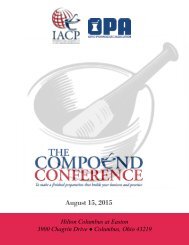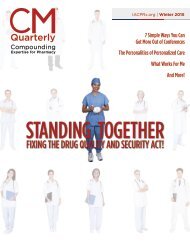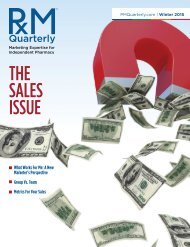Compounding Matters Quarterly - Spring 2015
Welcome to the spring issue of Compounding Matters Quarterly. In this issue: A Note From the President Six Things I Have Learned From Compounding Pharmacy Crises The Memorandum of Understanding: What It Is, What It Says, And What Happens Next The MOU -A Pharmacist's Perspective Personality of Personalized Care: Loren Madden Kirk IACP Foundation History Part 1 Save the Date For These Upcoming Programs
Welcome to the spring issue of Compounding Matters Quarterly.
In this issue:
A Note From the President
Six Things I Have Learned From Compounding Pharmacy Crises
The Memorandum of Understanding: What It Is, What It Says, And What Happens Next
The MOU -A Pharmacist's Perspective
Personality of Personalized Care: Loren Madden Kirk
IACP Foundation History Part 1
Save the Date For These Upcoming Programs
Create successful ePaper yourself
Turn your PDF publications into a flip-book with our unique Google optimized e-Paper software.
to determine the root of the problem and correct the<br />
issue, must notify FDA within 72 hours of receiving any<br />
complaint, and keep records of their actions for at least<br />
three years.<br />
Is that what the law, as written by Congress, says? While<br />
it places the responsibility for investigation of complaints<br />
squarely within the jurisdiction of the state agency, most<br />
likely the state Board of Pharmacy, it does not mandate<br />
or provide for a required reporting to the FDA within a<br />
specific time frame, nor does it define what constitutes<br />
a complaint, nor does it mandate recordkeeping. Is that<br />
what Congress truly intended? That question may have<br />
to be answered in the courts.<br />
Of particular concern to many Boards of Pharmacy<br />
is this: there will be a substantial financial burden to<br />
hire new investigators, new staff, and new technical<br />
infrastructure to comply with these requirements. This<br />
new “unfunded mandate” may have the untoward effect<br />
of preventing a state from even considering the MOU<br />
solely upon the basis of an economic impact on budgets<br />
that are already struggling with increased expenses.<br />
DEFINING INORDINATE QUANTITIES<br />
AND THE STATES’ RESPONSIBILITY<br />
In addition to the reporting requirements for adverse<br />
drug reactions or quality issues, the draft MOU<br />
requires that a State review compounding records<br />
during inspections. They need to determine whether<br />
the pharmacy, pharmacist or physician is distributing<br />
inordinate amounts of the compounded medications<br />
interstate. This is where the definition of “inordinate<br />
amounts” appears for the first time:<br />
• “Inordinate Amount”–If the number of units of<br />
compounded human drug products distributed<br />
interstate in a calendar month is equal to or greater<br />
than 30% of the number of units of compounded<br />
and non-compounded drug products distributed or<br />
dispensed both interstate and interstate.<br />
– The only exception to this rule – prescriptions that<br />
have been dispensed to an out-of-state patient at<br />
the facility in which the drug was compounded,<br />
and the patient or the patient’s agent carries<br />
that across state lines, are not counted in the<br />
calculation.<br />
If the State determines that the pharmacy, pharmacist,<br />
or physician has in fact distributed inordinate amounts<br />
of compounded drugs interstate, the State must notify<br />
FDA within seven days. The State must also take action<br />
against the pharmacy, pharmacist, or physician that may<br />
include a warning letter, enforcement action, suspension<br />
or revocation of a license, or other action consistent with<br />
State law. The FDA may also take action against the<br />
pharmacy, pharmacist, or physician.<br />
There’s another important issue here that may require<br />
judicial interpretation. The language of 503A specifies<br />
that the issue or distributing “inordinate amounts” be<br />
“addressed”; as proposed in the draft MOU, it requires<br />
We check your compliance<br />
before they do.<br />
Gates Healthcare Associates is a full-service<br />
pharmaceutical consulting firm with expertise in:<br />
• Strategic Planning and Business Development<br />
• Quality Assurance<br />
• Licensure and Accreditation<br />
• Regulatory Affairs<br />
• DEA/Controlled Substance Compliance Monitoring<br />
• USP Compliance<br />
• Pharmacy Practice and Training<br />
• <strong>Compounding</strong> Lab Design<br />
Visit our website to learn more about our capabilities.<br />
www.gateshealthcareassociates.com<br />
IACPRx.org/Publications | <strong>Spring</strong> <strong>2015</strong><br />
13












